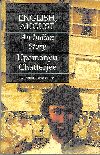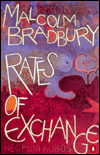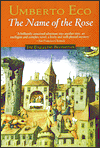 |
This is one of my favorite novels (science fiction or otherwise). It's about a physicist (or a meta-physicist, if you like) Shevek and his trials & tribulations. I suspect that my being a physicist has something to do with my liking the book so much - but in any case, I strongly recommend this book to anyone and everyone who wants to start reading serious, thought-provoking SF (and not the space-opera variety !). As a bonus it contains one of the most believable descriptions of a society functioning on anarchist principles. As Leguin makes it plain, anarchism is neither utopian nor impractical. There is a price to be paid to make a fiercely egalitarian society in that individual aspirations and ambitions are sternly looked down upon and effectively suppressed by peer pressure. But at least they have managed to overcome the harsh injustices of the traditional social systems that we see around us every day (especially here in India). |
 |
Kundera's best (at least according to me) - I also like his "The Joke" and "The Book of Laughter and Forgetting" but not as much as this book. I have been trying to see the film made by Philip Kaufmann based on the book for a long time - as I had been originally inspired to read the book after reading a review of the film in Sight and Sound magazine. But the book is definitely a great work. I especially liked the interweaving of musical themes throughout the story. Kundera is obsessed by the notion of "fidelity" - faithfulness to a spouse, to an idea, to a country. And he chooses to portray it through the lives of Tamas, Tamyna, Sabina and Franz - whose lives are constantly intersecting among themselves. |
 |
Funny, sad, profound, shallow - about the first posting of Agastya Sen, an young Indian adaministrative officer, in the provincial town of Madna. To relieve the tedious boredom of small-town life he smokes marijuana, reads Marcus Aurelius, has shocking fanatasies. I read it in '95/'96 - at a time when I was feeling pretty stuck with my life and research - it had a great impact upon me - I hate using the cliche "It changed my outlook towards my life" but in some way it did. It's not an Earth-shattering book - hell! maybe it's not even a great novel - but I like it. |
 |
What is it about the Bradburys and me ? I like almost all the stuff that Ray Bradbury and Malcolm Bradbury (no relation - to my knowledge) have written. This was the first book of Malcolm that I read - and I still like it the most. It's all about the experiences of the linguistics professor Petworth on a British Council-arranged tour of Slaka, a country under the Iron Curtain. Bradbury's humour hides biting satire - aimed at, among other things, the theories of modern linguistics, post-structuralism and socialist jargon. It contains an account of one of the most bizzare seductions (of Petworth by the novelist Katya Princip) in English Literature. But the most touching scene is when Petworth is seen off in the airport by his interpreter - almost at the end of the book. For some time I had toyed with the idea of (ghost)writing Katya Princip's magic-realist masterpiece "Nodu Hug" - but gave up the project as other commitments crowded in. You should also try to get hold of Bradbury's fictional travel guide : "Why Come to Slaka". |
 |
I haven't yet seen the film (starring Sean Connery as Father William of Baskerville) but the book is definitely one of the best I have ever read. There are so many oblique references scattered throughout the book (e.g., "Baskerville" - "Hounds of ..." - "Sherlock Homes") that you can't help recalling that the author is one of the leading authorities of Semiotics in the contemporary world. Ostensibly a story of crime and detection set in a medieval monastery - it hides several layers of interpretation, one beneath the other. At some level it's about metaphor and meaning, at another level it is about signs and their interpretation. Eco himself has written a slim volume called Reflections on the Name of the Rose - nominally trying to provide some background to the novel - but actually it is much more: a deep exploration of what it means to be an author. This one's also a must-read. |
 |
I was originally inspired to get this book after reading a resounding endorsement of it by Freeman Dyson in his Infinite in all Directions (another one of my favorite books) as well as in a very serious text on Deconstruction Theory. Intrigued, I managed to acquire a copy - and was amazed that one can make abstruse pre-socratic philosophy come alive and seem to be so relevant to our present concerns. A "racy" book on metaphysics would be an apt description. The main character of the book is Phaedrus (named after one of the characters in the "The Dialogues of Plato") who is on physical voyage across America on a motorcycle which parallels his metaphorical voyage in search of "Quality". Pirsig has written a second book, " Lila", which attempts to do for ethics what his previous book did for metaphysics - but I don't think it can hold a candle to "Zen and the Art..." |
 |
Another author who transcends the SF genre while nominally remaining within it. The first book of his that I read was The Sirens of Titan - which was good, but not great. Next I read this book and it was simply marvellous. Not only is the idea of ice-nine and the character of its creator, Dr. Felix Hoenikker (is it modelled on Dr. Strangelove ?), very captivating - but the concept of Bokannonism (whose first precept is that everything it says is ``foma'' - lies - just captivated me. The entire concept of a prophet or messiah has been taken for a ride by Bokannon. I am intrigued by the portrayal of prophets in fiction - and both Khalil Gibran (The Prophet) and Richard Bach (Illusions) had left me unsatisfied. But Bokannon is just my kinda' prophet. I later read Vonnegut's most celebrated book Slaughterhouse Five, or the Childrens' Crusade - and that's another marvellous book ! |